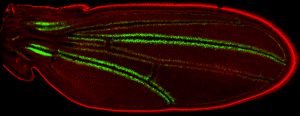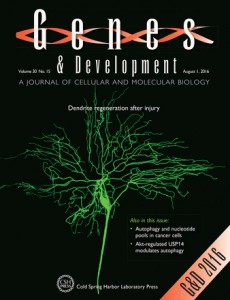Congratulations to Jill Dowen’s lab, which was awarded a 5-year NIH MIRA (Maximizing Investigators’ Research Award) grant from the National Institute of General Medical Sciences. This award totals $1.2 million and will support the study of fundamental mechanisms that connect genome organization and gene expression during development and disease.
Author Archives: Jennifer Rumbach
McKay Lab receives ACS Research Scholar Grant
Congratulations to Dan McKay’s lab, which has received a 4-year Research Scholar Grant from the American Cancer Society to explore how the switches that control gene expression get turned on and off during development.
In fruit fly and human genetics, timing is everything

A fruit fly wing, enhanced with red and green fluorescence to study genes involved in development over time.
The following article, highlighting the work of Daniel McKay, PhD appeared in the May 25, 2017 edition of UNC Health Care and UNC School of Medicine’s Vital Signs newsletter and highlights findings published in the June issue of Genes and Development.
Every animal starts as a clump of cells, which over time multiply and mature into many different types of cells, tissues, and organs. This is fundamental biology. Yet, the details of this process remain largely mysterious. Now, scientists at the University of North Carolina at Chapel Hill have begun to unravel an important part of that mystery.
Using the fruit fly Drosophila, a standard lab model for studying animal biology, the researchers discovered a cascade of molecular signals that program gene activity to drive the fly from one stage of maturation to the next, like a baby turning into an adult. Part of this programming, they found, involves alterations to the way DNA is packaged. Those alterations open up certain regions of DNA to allow gene activity and close off other regions to prevent gene activity. The scientists found evidence that these changes to DNA accessibility occur in sequence.
“We’re finally getting at one of the core mechanisms in biology, which determine the timing and sequence of events in normal animal development at the level of our genes,” said Daniel J. McKay, PhD, assistant professor of genetics at the UNC School of Medicine and biology at the UNC College of Arts and Sciences.
Read more at the UNC School of Medicine Newsroom…
Conrad transitioning to Lineberger, Bull promoted
After successfully serving as the Integrative Program for Biological and Genome Sciences (iBGS) Business Manager, Tracey Conrad has announced she will be transitioning to her new position as the Assistant Director, Business Administration of the UNC Lineberger Comprehensive Cancer Center effective Oct. 31.
Ms. Conrad was hired in July 2011 by School of Medicine (SOM) Finance and Business Operations (FBO) to provide financial support and strategic direction for a variety of departments, including iBGS. This includes managing all state, FNA, trust, and clinical accounts; managing faculty commitments; making projections and strategic planning.
“This is an outstanding opportunity for Tracey,” says Dr. Bob Duronio, iBGS director. “She has been continually committed to the success of iBGS and I have very much enjoyed working with her. Tracey’s commitment to ensuring a seamless transition to her new position has been exemplary of her skill and dedication.”
Delphi Bull, the current Business Officer, will be transitioning to the Business Manager position while retaining several of her current responsibilities. Ms. Conrad and Ms. Bull have been able to collaborate during the overlap of their positions to ensure a seamless transition.
“Delphi’s combination of talent and experience is an outstanding resource for the faculty, staff, and students at iBGS, “Duronio states. “I have no doubt that she is capable of taking on these additional responsibilities and I look forward to working with her in her new role.”
Questions regarding this transition may be directed to Dr. Bob Duronio at duronio@med.unc.edu.
Biology discovery: tight DNA packaging protects against ‘jumping genes,’ potential cellular destruction

Duronio, McKay, Strahl, Matera co-authored the paper that appeared in the August 2016 publication of Genes and Discovery.
The following article, highlighting the work of Robert Duronio, PhD; Daniel McKay, PhD; Greg Matera, PhD; Brian Strahl, PhD., appeared in the September 1, 2016 edition of UNC Health Care and UNC School of Medicine’s Vital Signs newsletter and highlights findings published in the Volume 30, No. 15 release of Genes and Discovery.
UNC School of Medicine researchers discovered that the major developmental function of heterochromatin – a form of tight DNA packaging found in chromosomes – may be to suppress activity of virus-like DNA elements known as transposons or “jumping genes,” which can otherwise copy and paste themselves throughout the genome, potentially destroying important genes, and causing cancers and other diseases.
Read more at the UNC School of Medicine Newsroom…
Rallying for Research

From top left: Blossom Damania, Phd, David Peden, MD, Brian Strahl, PhD, and Robert Duronio, PhD. Image courtesy of UNC Heath Care and UNC School of Medicine Newsroom.
Robert Duronio, PhD, assistant dean for research at the UNC School of Medicine, professor of genetics and biology, and director of the Integrative Program for Biological and Genome Sciences, recently headed to Capital Hill with three other UNC investigators to bring awareness to the need for more federally funded medical research.
Duronio, McKay, Matera, Strahl noted for development of histone research tool
The following article, highlighting the work of Robert Duronio, PhD; Daniel McKay, PhD; Greg Matera, PhD; Brian Strahl, PhD., appeared in the February 12, 2015 edition of UNC Health Care and UNC School of Medicine’s Vital Signs newsletter.
Epigenetic Breakthrough: A first of its kind tool to study the histone code

Robert Duronio, PhD; Daniel McKay, PhD; Greg Matera, PhD; Brian Strahl, PhD., Photo courtesy of UNC Health Care/School of Medicine News.
University of North Carolina scientists have created a new research tool, based on the fruit fly, to help crack the histone code. This research tool can be used to better understand the function of histone proteins, which play critical roles in the regulation of gene expression in animals and plants.
This work, published in the journal Developmental Cell, opens the door to experiments that are expected to uncover new biology important for a host of conditions, such as neurological diseases, diabetes, obesity, and especially cancer, which has become a hotbed of epigenetic research.
